#paver block
Text
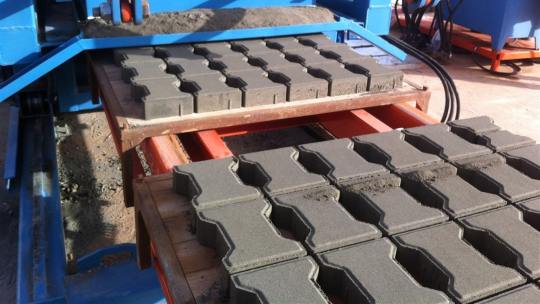
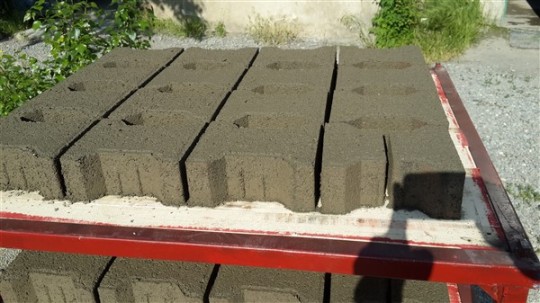
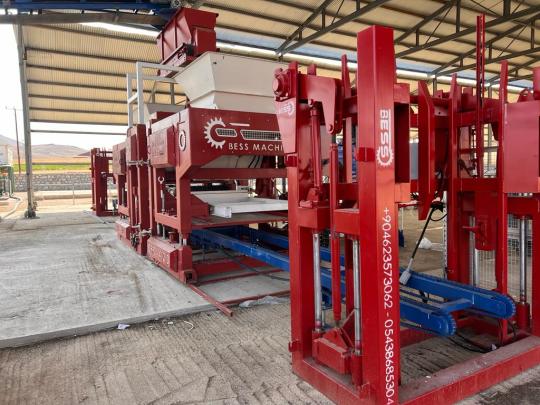
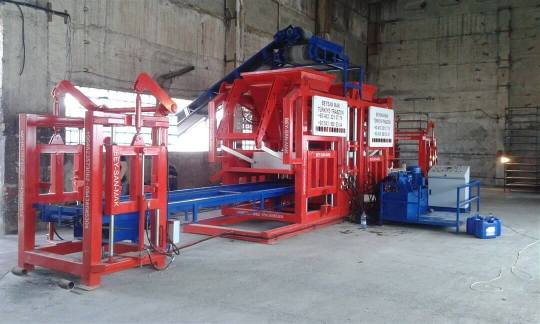
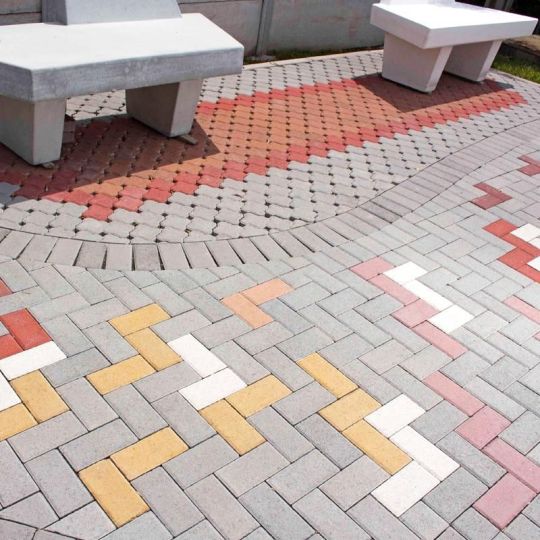
0 notes
Text
Unveiling the Boundless Potential of Paver Blocks: An Extensive Overview
Paver blocks have revolutionized the construction industry, offering a vast array of applications and creative possibilities. From concrete paver blocks to grass block pavers, these versatile materials have gained immense popularity for driveways, walkways, patios, and more. If you're seeking local paver block manufacturers or wish to explore the various types of paving blocks, this comprehensive guide is here to assist you. We will delve into the advantages and characteristics of different paver blocks, shedding light on their applications and helping you make an informed decision for your upcoming project.
Concrete Paver Blocks :
Concrete paver blocks are widely recognized as one of the most versatile and commonly used options available. They are manufactured using a blend of cement, aggregates, and color pigments, resulting in durable, low-maintenance surfaces with aesthetic appeal. These blocks come in diverse shapes, sizes, and patterns, allowing for endless design possibilities. With their ability to withstand heavy loads, concrete paver blocks are suitable for driveways, parking areas, and even commercial spaces. The interlocking feature ensures stability and prevents shifting, ensuring their long-lasting performance.
Grass Block Pavers :
Grass block pavers, also known as turf pavers or permeable pavers, present a unique blend of functionality and eco-friendliness. These blocks feature open cells that facilitate grass or vegetation growth, creating visually appealing surfaces while enabling water drainage. Grass block pavers are particularly advantageous in areas where effective stormwater management is essential, as they help prevent soil erosion and reduce the burden on local drainage systems. They find applications in parking lots, fire lanes, and residential areas, seamlessly blending with the surrounding landscape.
Types of Paving Blocks :
In addition to concrete paver blocks and grass block pavers, the market offers a diverse range of paving block options to cater to various requirements. Let's explore some popular types:
a. Interlocking Concrete Pavers: These blocks interlock tightly, providing strength, stability, and easy installation. Available in a multitude of shapes, colors, and surface finishes, interlocking concrete pavers offer limitless design possibilities.
b. Cobblestone Pavers: Cobblestone blocks exude a timeless and classic aesthetic. Renowned for their durability and ability to withstand heavy traffic, cobblestone pavers add an elegant touch to walkways, driveways, and courtyards.
c. Brick Pavers: Brick pavers exude a traditional and rustic charm reminiscent of old-world architecture. Available in various colors and sizes, they are commonly employed for patios, pathways, and landscaping projects.
d. Flagstone Pavers: Flagstone pavers boast irregular shapes and natural textures, imparting a distinctive character to outdoor spaces. They are frequently used to create natural-looking pathways, stepping stones, and pool decks.
Paver blocks have revolutionized construction and design, offering unparalleled versatility and durability. Whether you opt for concrete paver blocks, grass block pavers, or any other type of paving block, their potential is limitless. To ensure long-lasting results, it is essential to select high-quality materials from trustworthy local manufacturers. By comprehending the unique features and applications of various paver blocks, you can make an informed decision that aligns with your project requirements and enhances the aesthetic appeal of your outdoor spaces. Embrace the boundless possibilities of paver blocks and embark on a journey to create stunning, functional, and sustainable surfaces.
#Paver Block#concrete paver block#grass block pavers#paver block manufacturers near me#types of paving blocks
0 notes
Text
100 Best Concrete Pavers Design
The paving block design is a unique flooring application. This application includes paving, plinth stones, and underpinning for a compact mixture of uniform paving stones. The design has been created to optimise the lightweight, natural appearance of the materials and create a curving effect on the walls/slopes/stairs.
Call us at 83-770-440-77
Visit our official website https://www.comaron.com/blog/concrete-pavers-price
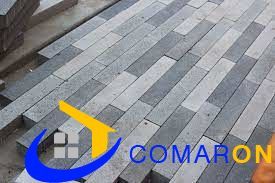
#block paving bricks#Red Brick#block paving#paver block#paver block price#interlocking bricks near me#cement paver block price#paver block price per brass#paver block tiles#pavement blocks#block tiles#tile block#paving block design#interlocking pavers design#interlocking paver blocks design#paver design#concrete pavers#paver block design#paver patterns
0 notes
Photo
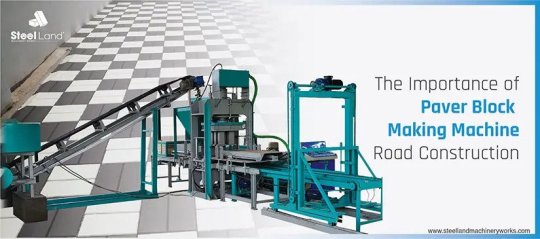
Key Importance of Paver Block Making Machine In Road Construction
Roads are regarded as the lifeline of any country or region. It connects the various regions and serves as the primary mode of goods transportation. For this reason, it is critical that roads and highways remain in good working order at all times.
A paver block making machine is an important tool for any paving project especially in road construction projects. Paver blocks are a versatile paving material that can be used for a variety of applications, from driveways and sidewalks to patios and pool decks. Pavers are available in a variety of colors, textures, and sizes, and can be used to create a variety of patterns and designs.
Paver block making machines allow for the mass production of paver blocks, which can save a lot of time and money on a paving project. These machines can produce pavers of any size, shape, or color, and can even be used to create custom designs. If you are planning a paving project, a paver block making machine can be a valuable asset.
To know why paver block making machine excellent choice for road construction, check our original blog: The Importance Of Paver Block Making Machines In Road Construction.
1 note
·
View note
Text

This is a picture of my fluffy black cat Brick lying stretched across the back of a recliner in my kitchen
BRICK! BRICK! BRICK!
🧱
7 notes
·
View notes
Text
Concrete Blocks - Manufacturing, Classification & Uses
Concrete blocks are nowadays replacing bricks in masonry construction, notably in many multi-storeyed buildings. They are available in three types namely solid, hollow and cellular, widely used for the construction of filler walls and boundary walls in RC framework.
Concrete blocks are usually made in large sizes to make blockwork faster and consume less cement in joints than the brickwork. If the percentage of the voids is more than 25%, then they are hollow blocks and blocks with voids less than 25% are only perforated blocks.
The cellular concrete blocks are generally referred to as lightweight aerated concrete blocks. All these blocks are extensively used for compound walls and non-loadbearing walls.
Hollow blocks are specially made for loadbearing walls, which are useful in reducing a dead load of masonry in buildings. Blocks can also be with cement and sand called cement-sand blocks or with cement and soil called soil-cement blocks which are of low strength and use for low-cost construction.
Manufacturing of Concrete Blocks
BIS recommends a fineness modulus of the combined aggregate between 3.6 to 4 and coarse aggregates used are of size 6 to 12 mm. Lean mixes up to 1:8 are generally used. Concrete mix for concrete blocks should not be richer than one part of the cement to six parts of the volume of combined aggregate.
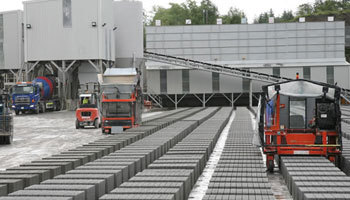
Concrete blocks can be handmade and also machine-made. The cast block is then cured in a water tank or yard for at least 14 days (water need to be changed at least every 4 days).
After curing, the blocks are dried for 4 weeks before being used in masonry construction. They should be stacked with voids in the horizontal direction to facilitate easy drying, or they should be steam cured and dried.
The whole process allows the complete shrinkage of the block to take place they are laid on the wall, which is very important for strong walls.
Classification of Concrete Blocks
Hollow concrete blocks
Open and Closed cavity-type hollow concrete blocks are classified into three grades:
Grade A - They possess a minimum density of 1500 kg/m³ and are used for load-bearing walls.
Grade B - They have a density below 1500 kg/m¬³ and used for load-bearing walls.
Grade C - These blocks are used for non-load bearing walls and have density more than 1000 kg/m³.
All these blocks are available in decorative facings like fluted facing to provide artistic effects.
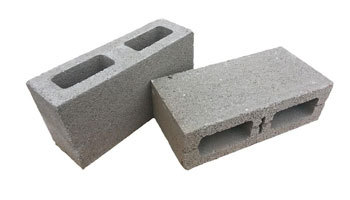
Solid concrete blocks
They should be manufactured for specific concrete strength of 4.0 and 5.0 N/mm² in 28 days. These blocks are used as load-bearing walls and have a density of not less than 1800 kg/m³.
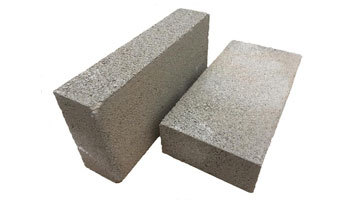
Paver blocks
These blocks are solid concrete blocks of different shapes specially made for exterior ground paving on sidewalks, parking lots, driveways, petrol pumps, industrial floors, etc.
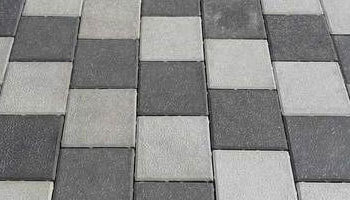
AAC Blocks
AAC blocks refer as Autoclaved Aerated Concrete Blocks. These blocks are also termed as light-weight hollow blocks.
They are prepared as solid blocks from cement, water and materials like ground sand, pulverized fly ash together with additives to aerate and stabilize the air bubbles.
The final result is a mixture of thick liquid which is then poured into steel moulds to form large cakes. After some time, the mixture sets and ready to cut into a serious of individual blocks of required size using taut steel wires.

Very light blocks for partition and moderate-weight blocks for light loadbearing walls can be obtained from aac blocks. These blocks do not shrink on drying as the material is obtained by autoclaving.
The autoclaved cement product is crystalline, which is different from the product obtained by normal wet curing or by ordinary steam curing.
Sizes and Tolerances
The nominal dimensions of concrete block as per BIS are as follows:
Length - 600, 500, 450 or 400 mm
Height - 100 or 200 mm
Width - 50, 75, 100, 150, 200, 250 or 300 mm
Actual sizes will be less than 10 mm of mortar thickness. For Concrete and Hollow concrete blocks nominal length 390 mm and height 190 mm. The thickness for loadbearing walls is 190 mm, compound walls 140 mm and for filler walls 90 mm.
These dimensions can easily be achieved in machine-made blocks than handmade blocks. The width of blocks use for load-bearing walls is 200 mm and for parapet or filler walls is 100 mm.
Points to Remember:
The mortar strength should not be more than the strength of the blocks. With high mortar strength, cracks will be less and very large, but with low mortar strength, cracks will be small and distributed.
We should use only blocks that are cured properly for at least 14 days and dried for 4 weeks to avoid shrinkage during construction.
We should not wet the blocks while placing in masonry construction.
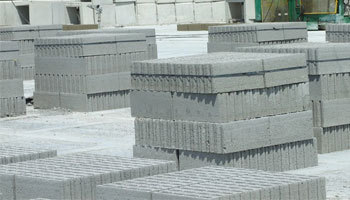
Freshly-made and uncured concrete blocks should never be allowed on the work.
Blockwork, particularly ordinary cement sand blocks and soil-cement blocks should not be used as loadbearing walls for concrete slab roof which favours to expand and contract with temperature.
The maximum difference in sizes allowed is ±5 mm in length and ±3 mm in height and width.
They should be protected from rains while being stored as they absorb moisture by wetting and shrinking on drying.
The main disadvantage of concrete blocks is shrinkage due to the movement of moisture content which is not present in bricks. As these blocks are much larger than bricks, any foundation movement will cause blockwork to crack more than the brickwork.
Cement blocks, Concrete blocks, Hollow concrete blocks, solid concrete blocks, Paver blocks, AAC blocks Concrete blocks in Hyderabad
#aac Blocks#aac blocks online#aac block size#Cement blocks#Concrete blocks#Hollow concrete blocks#solid concrete blocks#Paver blocks#AAC blocks
2 notes
·
View notes
Text
Cleveland Pool

Inspiration for a large contemporary backyard remodel with a natural pool fountain that is specially shaped
2 notes
·
View notes
Text
A Comprehensive Guide to Hydraulic Paver Block Making Machine
Welcome to "A Comprehensive Guide to Hydraulic Paver Block Making Machine." In the ever-evolving world of construction and infrastructure development, the significance of efficient and eco-friendly building materials cannot be overstated. Paver blocks have emerged as a popular choice due to their durability, versatility, and aesthetic appeal. At the heart of this revolution lies the Hydraulic Paver Block Making Machine – a game-changing technology that has transformed the production of paver blocks.
This article aims to delve into the intricacies of Hydraulic Paver Block Making Machine, providing a detailed exploration of their working principles, key components, and various types available in the market. We will uncover tips and some troubleshooting steps.
Moreover,we will highlight essential considerations for selecting the right machine that aligns with specific project requirements. Whether you are an industry professional seeking to optimize production processes or an enthusiast eager to grasp the mechanics behind paver block manufacturing, this guide will equip you with invaluable insights.
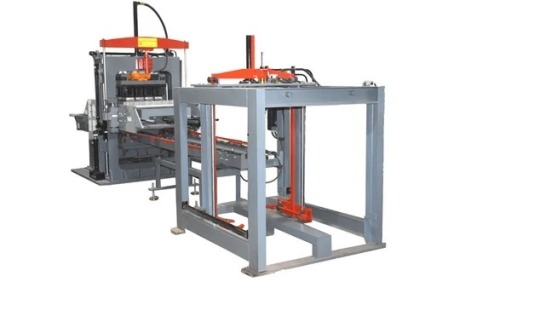
Understanding Hydraulic Paver Block Machine Specifications
When it comes to hydraulic paver block machines, understanding their specifications is crucial for making informed decisions. These machines are essential for producing high-quality, durable, and aesthetically pleasing paver blocks used in various construction projects.
Hydraulic paver block machine specifications encompass a range of key features. The capacity, which determines the number of blocks produced per hour, directly impacts productivity. The molding area size affects the dimensions and shapes of the blocks. Additionally, the power and pressure rating influence the machine's efficiency and performance.
Moreover, it's essential to consider the automation level and control system, as advanced automation ensures precision and ease of operation. The type of molds compatible with the machine allows for versatility in block design. Understanding these specifications empowers buyers to select the ideal hydraulic paver block machine that aligns with their specific project requirements, resulting in cost-effective and successful paving solutions.
Choosing the Right Paver Type: Interlocking vs. Non-interlocking
When it comes to selecting the right paver type for your project, the choice between interlocking and non-interlocking pavers plays a crucial role in determining the overall outcome. Here are some key points to consider for each option:
Interlocking Pavers:
Interlocking pavers are designed to fit tightly together, creating a durable and stable surface.
They offer excellent load-bearing capabilities, making them ideal for driveways, walkways, and high-traffic areas.
The interlocking design provides flexibility, allowing them to withstand ground movement without cracking.
These pavers come in various shapes, colors, and patterns, enabling versatile and visually appealing designs.
Installation is relatively easier due to the interlocking system, reducing labor time and costs.
Repairs are simple, as individual pavers can be replaced without affecting the entire surface.
Non-Interlocking Pavers:
Non-interlocking pavers are more affordable compared to their interlocking counterparts.
They are suitable for light to moderate traffic areas like patios, garden pathways, and decorative landscape elements.
Installation may require more precision and skill as they do not have the interlocking mechanism.
Although repairs are possible, they might be more labor-intensive and could involve replacing larger sections.
Pro Tips for Maintaining Your Paver Block Making Machine
Regular Cleaning: Clean the machine daily to remove any residual concrete and debris that can cause blockages or malfunctions.
Lubrication: Keep all moving parts well-lubricated to reduce friction and prevent wear and tear.
Inspection: Conduct routine inspections to identify and address any signs of wear, damage, or misalignment promptly.
Tighten Bolts: Check and tighten all bolts and nuts regularly to maintain stability and prevent vibrations.
Replace Worn Parts: Replace worn-out parts immediately to prevent further damage and ensure optimal performance.
Calibration: Calibrate the machine regularly to ensure accurate and consistent block dimensions.
Electrical Connections: Inspect and secure electrical connections to prevent electrical issues.
Professional Maintenance: Schedule periodic maintenance by qualified technicians to address complex servicing and extend the machine's lifespan.
Operating Guidelines: Train operators on proper machine operation and safety protocols to prevent mishandling or accidents.
Store in Shelter: Store the machine in a sheltered area to protect it from weather conditions and extend its longevity.
Troubleshooting Hydraulic Paver Block Making Machine
Low Block Quality: Adjust the hydraulic pressure and ensure proper alignment of molds to improve block quality.
Block Disintegration: Check the mix proportions of raw materials and the curing process for better block strength.
Oil Leaks: Inspect hydraulic hoses and connections, repair or replace damaged parts, and refill hydraulic oil as needed.
Excessive Noise/Vibrations: Tighten loose components and bolts, and ensure proper leveling of the machine.
Uneven Block Height: Verify uniform material distribution in the mold and calibrate the machine for consistent block height.
Machine Not Starting: Check power supply, fuses, and safety switches; repair or replace faulty electrical components.
Insufficient Block Production: Clean and maintain the machine regularly, and optimize the production process for efficiency.
Irregular Block Shapes: Inspect mold condition, ensure proper vibration, and adjust mold settings to achieve uniform shapes.
Safety Hazards: Implement strict safety protocols, provide training to operators, and display safety guidelines prominently.
Seek Professional Help: If issues persist, consult experienced technicians or manufacturers for advanced troubleshooting and repairs.
Conclusion
A Comprehensive Guide to Hydraulic Paver Block Making Machine highlights the indispensable role of perfect hydraulic machines in revolutionizing paver block production. The detailed exploration of working principles, types, and maintenance underscores their efficiency and eco-friendly advantages. By embracing these cutting-edge technologies, the construction industry gains a competitive edge in creating durable and visually appealing infrastructure. As Perfect Hydraulic Machines continue to shape the future of paver block manufacturing, their impact on sustainable construction practices remains unparalleled.
#Hydraulic Paver Block Making Machine#perfect hydraulic machines#hydraulic machines#Fly Ash Brick Machine
2 notes
·
View notes
Photo

Concrete Pavers - Transitional Landscape
An example of a large transitional full sun front yard concrete paver landscaping in summer.
2 notes
·
View notes
Text
It is often a crucial decision to choose outdoor landscaping material, selecting paving material to enhance the looks of the place as well as maintaining the strength and durability becomes very confusing sometimes. As it has a big impact on how the place looks, feels, and performs overall. Visit us https://www.paversindia.com/
0 notes
Text
The Essence of Brick and Block Retaining Walls in Brisbane: A Blend of Functionality and Aesthetic Appeal
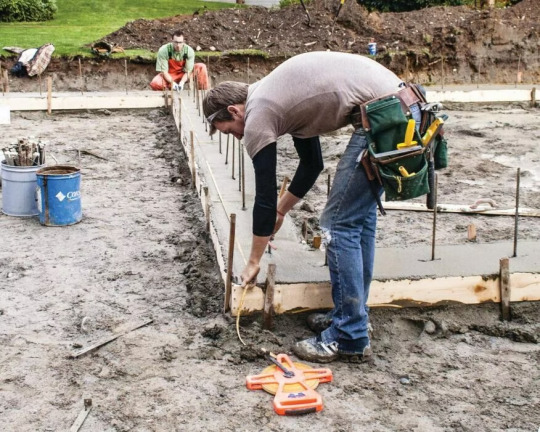
In the picturesque city of Brisbane, where urban landscapes meet natural beauty, retaining walls play a crucial role in shaping the terrain and preserving the integrity of properties. Among the array of options available for constructing these vital structures, brick and block retaining walls stand out for their durability, versatility, and timeless charm. Let’s delves into the essence of brick and block retaining walls in Brisbane, exploring their practical benefits, aesthetic appeal, and the factors that make them an ideal choice for both residential and commercial projects in the region.
The Functionality of Retaining Walls
Brick and block retaining walls in Brisbane serve a dual purpose in its architecture. Firstly, they provide essential structural support, preventing soil erosion and managing the distribution of land pressure, particularly on sloped terrains. Secondly, they contribute significantly to the creation of usable spaces, whether it's leveling out areas for gardens, patios, or pathways, thereby maximizing the potential of outdoor living areas.
The Durability of Brick and Block Construction
In Brisbane's subtropical climate, durability is paramount when it comes to construction materials. Brick and block retaining walls in Brisbane offer exceptional resilience against the elements, standing strong against heavy rainfall, intense heat, and humidity. Unlike timber, which is susceptible to rot and termite damage, bricks and blocks are impervious to such threats, ensuring longevity and minimal maintenance requirements.
Versatility in Design and Construction
One of the most appealing aspects of brick and block retaining walls in Brisbane is their versatility in design. Whether you seek a contemporary aesthetic or a more traditional look that complements Brisbane's colonial heritage, these materials can be adapted to suit diverse architectural styles. Additionally, they offer flexibility in construction, allowing for curved or angular walls that conform to the contours of the landscape, enhancing visual interest and functionality.
Aesthetic Appeal: Enhancing Brisbane's Urban Landscape
Beyond their functional utility, brick and block retaining walls in Brisbane contribute to the aesthetic charm of Brisbane's urban environment. With a rich palette of colors, textures, and patterns to choose from, they add character and warmth to outdoor spaces, seamlessly integrating with surrounding structures and natural elements. Whether it's a rustic brick wall that evokes a sense of history or a sleek, modern design that complements contemporary architecture, these walls enhance the visual appeal of residential neighborhoods, commercial developments, and public spaces alike.
Environmental Sustainability
In an era where sustainability is a paramount concern, brick and block construction offers eco-friendly solutions for retaining walls. Made from natural materials such as clay and concrete aggregates, these walls have minimal environmental impact compared to alternative materials like steel or concrete. Furthermore, their durability reduces the need for frequent replacements, thereby conserving resources and reducing waste over the long term.
In the dynamic urban landscape, where natural beauty meets modern development, brick and block retaining walls in Brisbane stand as enduring symbols of functionality, durability, and aesthetic appeal. From their structural integrity to their versatile design possibilities, these walls serve as integral components of landscape architecture, shaping the terrain and enhancing the visual richness of the cityscape. As Brisbane continues to evolve, the timeless allure of brick and block construction remains a cornerstone of sustainable, visually captivating design.
#Brick and Block Retaining Walls#brick wall#brick manufacturer in brisbane#brick pavers#brick exterior#home renovation brisbane#building bricks#all types of brick and block walls in gold coast
0 notes
Link
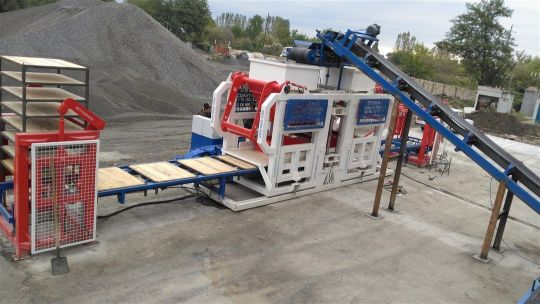
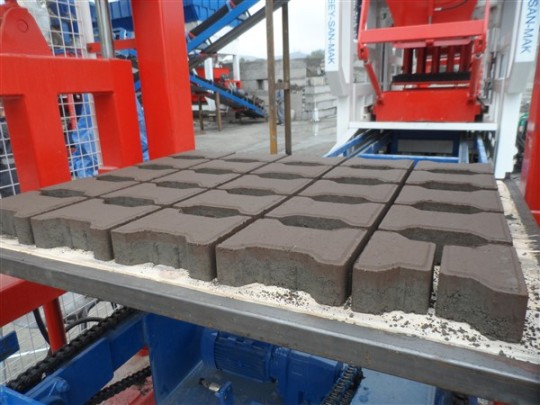
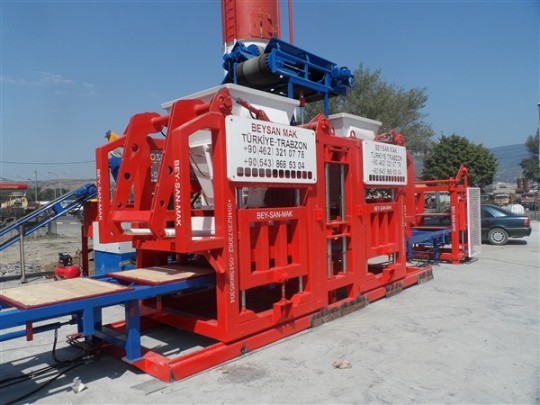
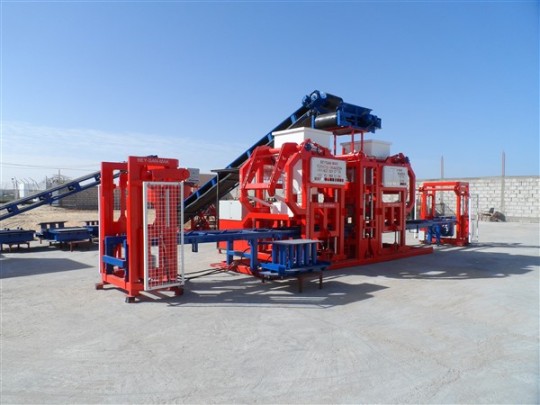
0 notes
Text
#Bricks Machine Manufacturer Morbi#brick machine manufacturer in gujarat#bricks machine manufacturer rajkot#fly ash brick making machine manufacturer#automatic fly ash brick making machine#fly ash brick making machine fully automatic#fly ash brick making machine supplier#paver block machine manufacturer morbi#paver making machine for sale#paver block making machine manufacturers#automatic paver block making machine
1 note
·
View note
Text
Buy Paver Block Tiles and Design | Comaron.com
Block paving bricks is a traditional method of laying the base for a walkway or driveway. It is similar to flagstone in that it is composed of large, flat stones laid in a uniform pattern
Call us:- 83-770-440-77
visit our official website. https://www.comaron.com/blog/paver-block-price
#block paving bricks#block paving#paver block#paver block price#interlocking bricks near me#cement paver block price#paver block price per brass#paver block tiles#pavement blocks#block tiles#tile block#tmt price#tmt bar price#tmt price today#tmt steel price#construction material#building material#cement price#steel bar price#jsw steel price today per kg#tmt steel
0 notes
Text
Interlocking Patio Stones | A-zlandscape
Transform your outdoor space with our high-quality interlocking patio stones. Durable, stylish, and easy to install - create the perfect patio, walkway, or driveway. Browse our selection and elevate your landscape today.
#backyard design ottawa#backyard landscaping ottawa#interlock backyard#front yard design#interlock driveway#interlock driveway ottawa#interlock driveway repair#driveway extension#interlock orleans#backyard landscaping#pool interlock#interlocking patio stones#permacon pavers ottawa#landscaping orleans#retaining wall ottawa#paving retaining wall#natural stone pavers#retaining wall#permacon pavers#interlock repair ottawa#interlock kanata#driveway interlock repair#pavers swimming pool#retaining wall landscaping#backyard design#landscaping companies kanata#interlocking retaining wall blocks#landscaping kanata#interlock#interlock ottawa
0 notes
Text
Affordable Paver Tiles Blocks in India
Looking to enhance the beauty and functionality of your outdoor spaces? Look no further than paver tiles block from Goyal Cement Blocking. Our high-quality paver tiles are the perfect solution for creating stunning driveways, walkways, patios, and garden paths that are both durable and aesthetically pleasing.
https://www.allreadable.com/df2ciqAH
0 notes